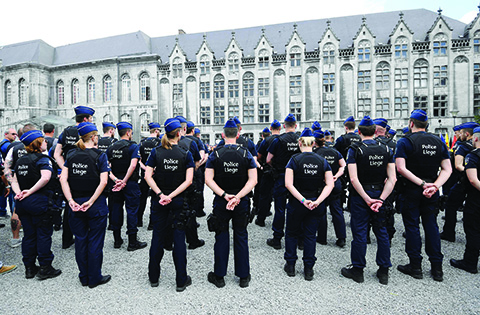 LIEGE: Policemen take part in a tribute ceremony yesterday for the victims of a shooting. – AFP
LIEGE: Policemen take part in a tribute ceremony yesterday for the victims of a shooting. – AFPLIEGE/BRUSSELS: Belgian authorities faced questions yesterday over why a prison inmate, suspected of links to radical Islamists in jail, was let out for a day, enabling him to carry out what police called a “terrorist attack” in the city of Liege. The justice minister, who oversees the prison service, said he felt “responsible” for Tuesday’s bloodshed in which two policewomen and a bystander were killed. The attacker was shot dead by police at a nearby school shortly afterward. “The question of whether this man should have been given leave is striking because he killed three completely innocent people with a wish to kill himself,” Koen Geens told RTBF radio. “I have to examine my own conscience.”
Interior Minister Jan Jambon said authorities were still examining the motives of Benjamin Herman, a 31-year-old Belgian drug dealer who had been in jail for years but was let out for two days on Monday to prepare for an eventual release in 2020. But federal prosecutors said there was evidence that they were dealing with “terrorist murder”. Herman had shouted “Allahu Akbar”, the Muslim affirmation of faith, during his attack and he had had contact with Islamist radicals in jail in 2016 and early 2017.
He also appeared to have followed online exhortations from Islamic State to stab police officers and use their service weapons to shoot others, prosecutors said. Adding further evidence of an Islamist motive, a school cleaning woman who was briefly held by Herman told public broadcaster RTBF that he assured her he would do her no harm as she was a Muslim and told her to spare her tears for Palestinians and Syrians. Officials praised the quick wittedness of the cafe owner outside whose bar Herman had killed the two policewomen, aged 54 and 44. By the time the killer, wielding two police pistols, came in looking for more victims, he had got all his customers into hiding.
Confirming that Herman was also believed to have killed an acquaintance 50 km away on Monday night, Jambon told RTL radio: “There are signs he was radicalized in prison but is it that radicalization which drove him to commit these acts? “It could have been because he had nothing to look forward to, because he also killed someone the night before, the guy’s psychology and the fact, it seems, he may have been on drugs.” He said that although Herman was flagged up in security reports on possibly violent Islamists in 2016 and early 2017, he had appeared to be something of a fringe figure. Unlike after other suspected “lone wolf” attacks in Europe, there has been no claim of responsibility by Islamic State.
Jail to jihad?
In and out of jail for a variety of crimes since 2003, Herman may have found a path to violence that has heightened concerns that Europe’s prisons are incubators for jihadism. In Belgium, a prisoner’s inclusion on a state security list as a suspected radical Islamist is not automatically passed on to all police or the prison service, experts say. It was the fourteenth time since his detention that he was granted temporary leave, to help him prepare for eventual reintegration into society, Justice Minister Geens said.
“Everyone in Belgium is asking the same question: how is it possible that someone convicted of such serious acts was allowed to leave prisons?” Deputy Prime Minister Alexander de Croo was quoted as saying. The national crisis center, on high alert since a Brussels-based Islamic State cell helped kill 130 people in Paris in 2015, did not raise its alert level, an indication follow-up attacks were not expected. “I think it was just one individual who completely snapped and went on a killing spree,” said Pieter Van Ostaeyen, a specialist on jihadism who has maintained contacts with Belgians fighting in Syria. “I don’t think it was an organized attack.”
Convicts have been behind several Islamist militant attacks in Europe. Hundreds of prisoners deemed radical by authorities are due to be released in the coming years. The Belgian parliament warned in a report late last year: “They come in as drug dealers and leave as Salafi jihadists,” a security source said. Security services in Belgium and France have faced criticism at home and abroad for intelligence failures and their response to attacks in Brussels, Paris and Nice. - Reuters









